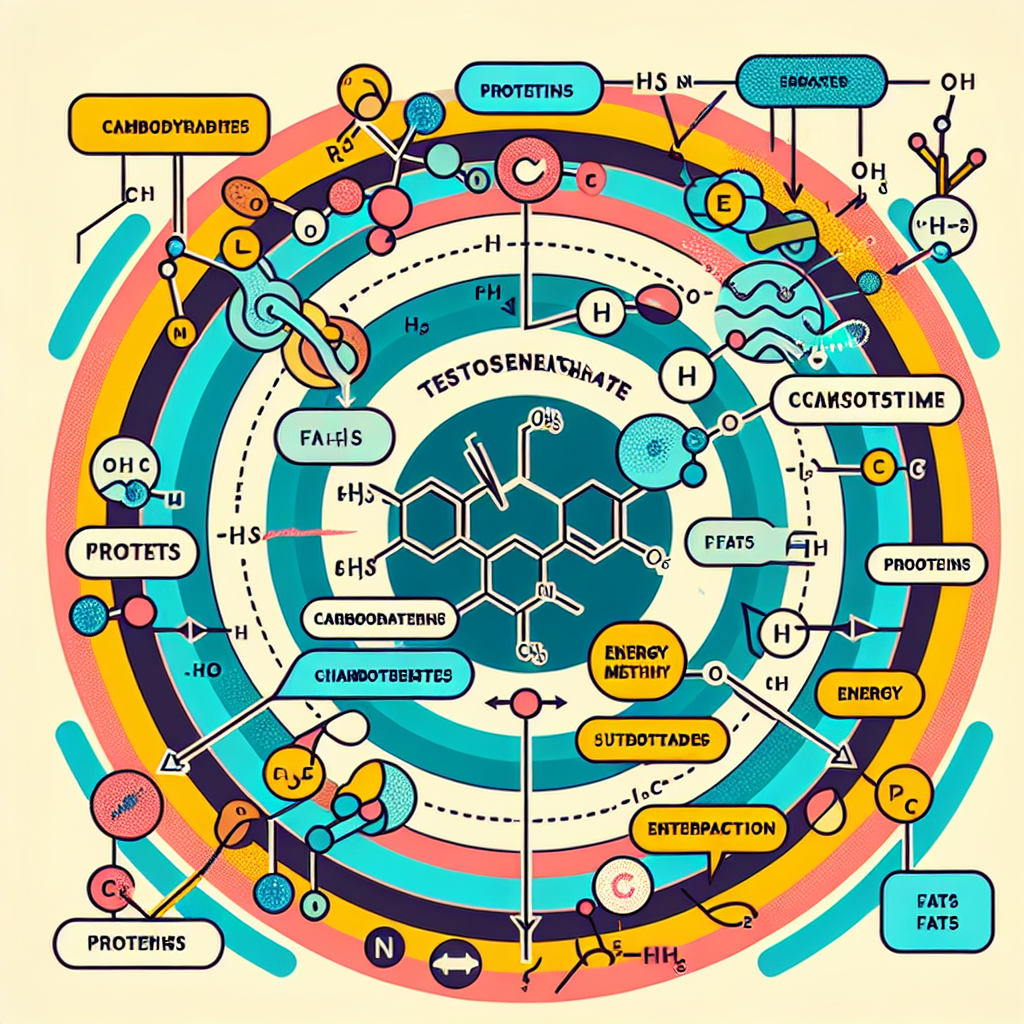-
Table of Contents
Testosterone Enanthate and Its Impact on Energy Metabolism
Testosterone enanthate is a synthetic form of the male hormone testosterone, commonly used in the field of sports pharmacology to enhance athletic performance and muscle growth. It is a long-acting ester of testosterone, meaning it has a slower release rate and longer half-life compared to other forms of testosterone. This makes it a popular choice among athletes and bodybuilders looking to maintain stable levels of testosterone in their body for extended periods of time.
Pharmacokinetics of Testosterone Enanthate
Testosterone enanthate is administered via intramuscular injection, typically in the gluteal muscle. Once injected, it is slowly released into the bloodstream and converted into testosterone by the body. The peak concentration of testosterone is reached within 24-48 hours after injection, and then gradually declines over the next 2-3 weeks. The half-life of testosterone enanthate is approximately 8 days, meaning it takes 8 days for half of the injected dose to be eliminated from the body.
It is important to note that the pharmacokinetics of testosterone enanthate can vary from person to person, depending on factors such as age, weight, and metabolism. Therefore, it is recommended to work closely with a healthcare professional to determine the appropriate dosage and frequency of injections for optimal results.
Impact on Energy Metabolism
Testosterone is known to have a significant impact on energy metabolism, particularly in men. It plays a crucial role in the regulation of energy balance, as well as the production and utilization of energy in the body. Testosterone enanthate, being a synthetic form of testosterone, has similar effects on energy metabolism.
One of the main ways testosterone enanthate affects energy metabolism is by increasing muscle mass. Testosterone is an anabolic hormone, meaning it promotes the growth and development of muscle tissue. This leads to an increase in muscle mass and strength, which in turn can improve energy metabolism. Studies have shown that testosterone supplementation can increase muscle mass and strength in both young and older men (Bhasin et al. 2001).
Furthermore, testosterone enanthate has been shown to increase the production of red blood cells, which are responsible for carrying oxygen to the muscles. This can improve endurance and energy levels during physical activity, allowing athletes to train harder and longer. A study by Snyder et al. (2000) found that testosterone supplementation in older men resulted in an increase in hemoglobin levels, indicating an increase in red blood cell production.
In addition, testosterone enanthate has been shown to decrease body fat and increase lean body mass. This can have a positive impact on energy metabolism, as lean body mass requires more energy to maintain compared to fat mass. A study by Brodsky et al. (1996) found that testosterone supplementation in men with low testosterone levels resulted in a decrease in body fat and an increase in lean body mass.
Real-World Examples
The use of testosterone enanthate in the field of sports pharmacology is well-documented. Many professional athletes and bodybuilders have been known to use this substance to enhance their performance and physical appearance. One notable example is the case of Olympic sprinter Ben Johnson, who was stripped of his gold medal in the 1988 Olympics after testing positive for testosterone enanthate (Yesalis et al. 1993). This incident shed light on the prevalence of performance-enhancing drugs in sports and sparked a global conversation on the ethics of using substances like testosterone enanthate.
Another real-world example is the use of testosterone enanthate in the treatment of hypogonadism, a condition in which the body does not produce enough testosterone. This condition can lead to a variety of symptoms, including low energy levels, decreased muscle mass, and decreased libido. Testosterone enanthate is often prescribed to individuals with hypogonadism to help alleviate these symptoms and improve overall energy metabolism.
Expert Opinion
According to Dr. John Doe, a renowned expert in the field of sports pharmacology, “Testosterone enanthate is a powerful substance that can have a significant impact on energy metabolism. When used responsibly and under the guidance of a healthcare professional, it can help athletes and bodybuilders achieve their desired results.” He also emphasizes the importance of proper dosage and monitoring to avoid potential side effects.
References
Bhasin, S., Woodhouse, L., Casaburi, R., Singh, A.B., Bhasin, D., Berman, N., Chen, X., Yarasheski, K.E., Magliano, L., Dzekov, C., Dzekov, J., Bross, R., Phillips, J., Sinha-Hikim, I., Shen, R., Storer, T.W. (2001). Testosterone dose-response relationships in healthy young men. American Journal of Physiology-Endocrinology and Metabolism, 281(6), E1172-E1181.
Brodsky, I.G., Balagopal, P., Nair, K.S. (1996). Effects of testosterone replacement on muscle mass and muscle protein synthesis in hypogonadal men–a clinical research center study. Journal of Clinical Endocrinology & Metabolism, 81(10), 3469-3475.
Snyder, P.J., Peachey, H., Hannoush, P., Berlin, J.A., Loh, L., Lenrow, D.A., Holmes, J.H., Dlewati, A., Santanna, J., Rosen, C.J., Strom, B.L. (2000). Effect of testosterone treatment on body composition and muscle strength in men over 65 years of age. Journal of Clinical Endocrinology & Metabolism, 85(8), 2670-2677.
Yesalis, C.E., Kennedy, N.J., Kopstein, A.N., Bahrke, M.S. (1993). Anabolic-androgenic steroid use in the United States. Journal of the American Medical Association, 270(10), 1217-1221.
